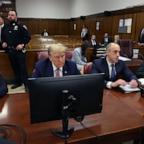Trader Or Prankster? Forbes Called Alessio Rastani and Asked
Trader tells BBC he wants a payout if the Eurozone crashes.
Sept. 27, 2011 — -- On Monday a purported independent trader going by the name Alessio Rastani appeared on BBC and said some delicious things, namely that he's been dreaming about a recession and that Goldman Sachs rules the world.
Gawker promptly called him a "sociopath." My colleague at Forbes said he might be a psychopath. Some people commenting on his Facebook page called him a "muppet," a "nasty little self-publicist" and a "totally honest bastard who wants to rise to the top of [on] the rest of the world's misery." Another suggested that he die.
But then talk circulated that Rastani might be a member of Yes Men, a collective of impersonators. Was his little talk a hoax? When I reached Rastani in London to ask, he spouted some vague wisdom, mentioned his "trader friends," and insisted that trading is his obsession. He started off the conversation:
AR: I had something to tell you guys. The guy who wrote [on Forbes] mistakenly wrote that I'm a Wall Street trader. I'm not an institutional trader. I wouldn't dream of ever doing that. I trade my own money, my own account. That's what I always wanted to do. I like the idea of not having a boss. I did work for one institution, but I realized I want to do it for myself. I just started, and I worked with some of the best traders in the world. I saw how they were doing things. Eventually I developed my own style.
FORBES: Who are some of those 'best traders?'
AR: I started with traders just like me, trading for themselves. They have their own trading room, desk, basically trading their own money. Some of these guys are millionaires and doing really well, I followed their footsteps. What did I learn from them? I think the most important thing I learned from them is how to not lose money, to protect themselves against risk. …. What you realize is the most important thing is to take care of the risk. To not have an opinion about something, to see what's in front of you. Follow the charts and signals. You have to have a plan of action, a set of trading rules or a trading plan. So what that really means is a set of rules that tell you exactly when you're going to enter the markets and when you're going to exit. You've got to be humble about your decision. If you see something is not working for you, if you get into a trade, you have to get out. As they say, cutting your losses short. That's sort of general knowledge, nothing shocking, nothing new.
FORBES: When did you start trading?
AR: I started trading for real in 2006. And to be honest, the teaching side of it is mostly just a bit of fun. In this business you meet people who come up to you and say, "Can you show me how to do this?" It's rewarding to show people how it all works.
FORBES: What kind of trader are you?
AR: What kind of trader? What do you mean?
FORBES: Usually traders have strategies.
AR: Oh I see, I'll tell you what kind of trader I'm not. I'm a very risk-averse person. I never get into a position that I haven't fully analyzed. I trade mostly the Dow futures, also a bit of forex, and I trade stocks, the most liquid stocks in the market. What I look for, essentially what I look for is opportunities. I'm a trend trader, so I trade trends, that what I like. And I like volatility. There are three things I wait for. I look for moments of high volatility, or the early parts of a volatile market, and I trade the momentum.




